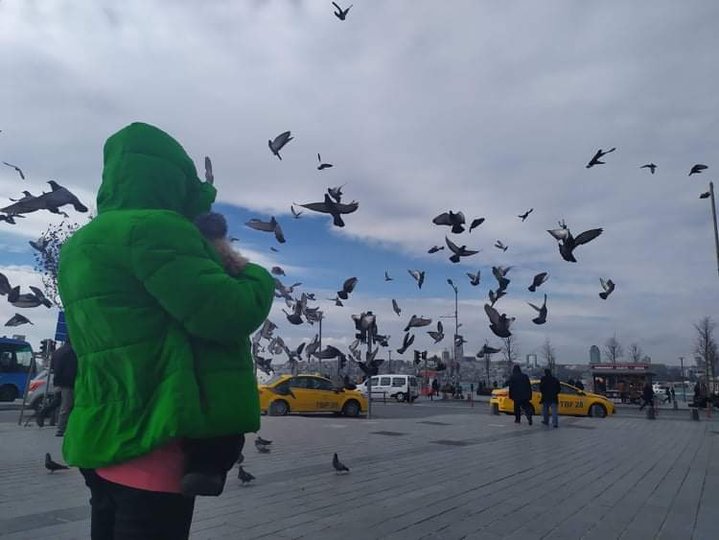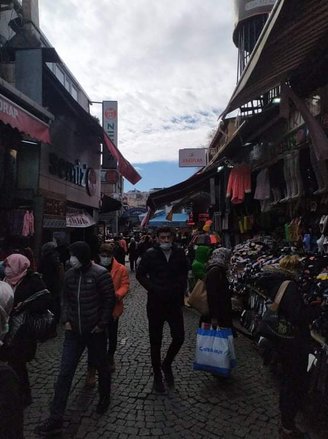
Photos: James Tressler.
###
We were annoyed. I know I was. You see, we’d planned to walk to Kuzguncuk, but the weather was not cooperating. It was sunny but icy gusts hit us as soon as we started down the hill to the coastal road. Our boy Leo began crying because the gusts were hitting him in the face. He was cold in the stroller. And it was the one day I’d decided we didn’t need the kangaroo pack since Leo usually loves the stroller and the forecast had said it would be warmer.
“Shall we go home? Or can you take the stroller back and get the kangaroo?” My wife was holding Leo, the hood and mask obscuring her face except her lovely expressive brown eyes, which were tired and anxious at the moment.
“I’ll get the kangaroo,” I muttered, turning with the stroller and trudging back up the hill, cursing under my breath. It was Friday, near the end of the term, and I’d felt good because I got up early that morning and finished marking all the students’ papers and updating their grades in the system. And we’d been looking forward to the walk to Kuzguncuk under sunny skies.
As I returned with the kangaroo pack and loaded Leo into it, we noticed that a delivery truck had pulled up.
“Maybe Leo’s mattress has arrived,” Ozge said. We’d been expecting it. She flagged down the driver and made inquiries. He nodded, got out of the truck and lifted a mattress from the back seat.
“Can you take it downstairs?” my wife asked. I took the mattress, it was very light and covered in plastic, back to the apartment, sprayed the plastic with liquid bleach and put it out on the balcony. Some Friday, I thought, with the visceral anger we often feel nowadays. The feeling that you’re not living the life that you should be living. Images – distant and fragrant – of having drinks with friends in Kadikoy, of doing something fun – “Why does everything have to be ‘have to?’ I muttered aloud. Well, at least we wouldn’t have to wait for the package anymore, and Leo really did need a new mattress for his crib.
Back on the street, Ozge was waiting at the corner with Leo. He had calmed down and as we began walking through the neighborhood, he put on his customary “outside” face: a curious silence, looking around at everything with the eyes that are like his mother’s, wide, brown and wistful. At home, he’s a very chatty, funny boy, but on the street he is different.
Nevertheless, we were tired. Ozge was feeling the same as I was.
We didn’t really have a destination, except the vague purpose of getting Leo out. The weekend lockdowns meant he wouldn’t see the outside world until Monday (except for a few minutes here and there, when we sneak him out for a walk on our street). We stopped at our neighborhood bakery and bought some of the fresh, thin pide bread that is really excellent, especially when toasted.
“Well, I guess we can’t blame the weather and we can’t blame Leo,” I mused. “What can we do about it?”
“Let’s go to the market,” my wife said, agreeing. “I want Leo to at least see some human beings other than us before being inside all weekend.”

At the bottom of the hill, we passed a local mosque. Friday prayers had just ended, and a fair number of people, mostly middle-aged and elderly, were coming out onto the quiet street. At the entrance of the mosque, an old covered woman was selling packets of tissue, or trying to. She entreated us in a scratchy, tiny voice but we shook our heads and continued on. I felt kind of bad. Normally, we buy a packet of tissue now and then, but nowadays it just didn’t sound like a good idea, and we’d have to spray it down anyway.
The wind was still gusting strongly. Dry leaves whisked past, scraping along the pavement, making thin scratching sounds. We took a shortcut in a passageway that leads through an old Ottoman cemetery, the stones very ornate and opaque-looking. An old man, dressed in a suit and wearing a hat, was in front of us, walking in a stooped way with a cane. I thought about how the pandemic has hit the elderly especially hard.
“There are a lot of old people out today,” I said aloud. “Do they still have restrictions?”
“Yes,” Ozge said. “They can go out between 10 and 2, I think. But on Fridays there are exceptions because of the prayers. And young people can go out in the afternoons.”
I knew that because of my students. We have our lessons in the mornings so that they can utilize the time in the afternoons to go out if they wish. Of course, by the end of the term, only about half the class was showing up to the Zoom lessons, most presumably preferring to just sleep in rather than maximize the possibilities of online education (probably another reason for the persistent feeling of annoyance that has been dogging me of late).
We reached the main thoroughfare. It was buzzing as always. Mostly empty city buses groaned by, yellow taxis, cars. We waited for a gap in the traffic and crossed with Leo in the kangaroo. From there it was just a five-minute walk to the bazaar.
“Of course now the weather is perfect,” my wife observed. It was true. Here the wind had been chased off by the clamor of the shops, cut off by the buildings. We entered the cobbled street where the markets bloomed with goods and all variety of nuts and fruits, candies, dried peppers hanging from windows. The shiny skins of the fresh fish over at the fish markets, the whole chickens basted and golden brown as they rotated on spits, the pide bread on offer at the bakeries. Indeed, all the world’s offerings on display (except alcohol, this is Uskudar, after all). I felt revitalized, remembering that the teeming markets, with all their bustle, was one of the things I’d always loved about this city. Even with the pandemic, and the sellers and customers alike wearing masks, the markets hurtled on, full of color and life, as they always did in the best and worst of times.
We took Leo through the markets and let him look around, and then we went out to a plaza where all the pigeons gather because he likes to watch the birds flock and poke around and dart and fly off with his ever-roaming eyes. After they’d gone, disappearing in the sudden return of the cold gusts of wind, we decided to head home.
“What shall we have for dinner?” Ozge asked.
“Shall I stop and get some chicken?”
“No, don’t buy anything. We have enough at home. I want to make a salad.”
“Do we have mercimek (lentils)? I asked.
My wife nodded.
“We can have soup and salad and the fresh bread we bought,” I said. I thought about the bottle of cabernet chilling on the balcony at the apartment, and how we could have that with dinner.
We were feeling much better after the walk, and the evening began to take a pleasant shape. The Bosphorus was grey and choppy as we walked along the coastal road and back up the hill to our neighborhood.
“What was the name of that nightclub where the terrorist attack was (a few years ago)?” my wife asked, scanning the opposite side of the Bosphorus. “Wasn’t it over there?”
“It was further up, past the Ortakoy mosque,” I said, remembering.
“Reina!” Ozge said. “That was the name. God, there were only a few proper nightclubs in Istanbul, like posh ones, and now they’re all gone.”
“I was just thinking that,” I said. “I mean, when I arrived here in 2009, Istanbul was really a vibrant city. Really cosmopolitan. Taksim especially. And then we had the Gezi Park protests, then the coup attempt, and now coronavirus …”
We talked like this for a little bit as we reached our street, about how things had changed, things that we seldom discuss because we’re so preoccupied with things like changing diapers and washing dishes, the domestic realities made all the more persistent and engulfing because of the pandemic. Always that feeling that you can never really break away, go to some place where you could really feel free and unpossessed. In the old days, you could always say, “Maybe I’ll go to China, or Vietnam or Chile,” or some place like that, but nowadays there is no such place in the world, nowhere to run. The thing to do is just try to make the best with where you are and with what you have. And Istanbul has so much of everything.
Leo, meanwhile, was still quiet, just looking around with his outside face as he had been for the past hour or so.
“Hey son,” I said. “Are you ready to get home to be warm and play with your toys?”
He didn’t answer, still in his street mode, lost in his observations. Yes, he’s a good little boy. It was nice to be heading home, where he would be his funny, talkative self again. But his outside face is nice too, seeing the world as this big, mysterious open place, which it is.
And I thought about what I’d said earlier, about how you couldn’t blame anyone or anything for the way things were. I remembered an old Turkish expression, or part of it anyway. It was something like: “Don’t blame what falls from the sky, for what falls from the sky must be a blessing.” I’m probably embellishing that a little, but why not? What can we do about it anyway except try to get through these days the best we can.
###
James Tressler, a former Lost Coast resident, is a writer and teacher.
CLICK TO MANAGE